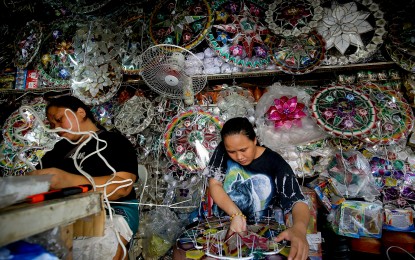
EMPOWERING WOMEN. Women workers install LED lights in lanterns made of capiz shells at a stall in Quiapo, Manila in this Oct. 8, 2023 photo. President Ferdinand R. Marcos Jr. on Tuesday (March 12, 2024) called on member-states of the 68th session of the Commission on the Status of Women to pursue innovative solutions to ensure equal and full participation of women in society. (PNA file photo by Joan Bondoc)
MANILA – President Ferdinand R. Marcos Jr. has called on the member-states of the 68th session of the Commission on the Status of Women (CSW68) to pursue innovative solutions to ensure equal and full participation of women in society.
In a video message played during the welcome dinner for the heads of the delegation for CSW68 on Tuesday (Manila time)in New York, Marcos stressed the urgency of achieving gender equality and women empowerment.
“As chair of this session, we urge collective action towards innovative solutions for women's empowerment so together, let’s achieve a meaningful result for gender equality,” Marcos said.
Marcos made the call, as he lamented that poverty, crisis, and violence “disproportionately affect women.”
He noted that in the Philippines, there are several legislations aimed at providing women a secure environment by criminalizing sexual harassment and trafficking.
He added that the government is focused on promoting women’s rights and ensuring their participation to sustain development goals in the country.
“And to combat these [issues challenging women], the Philippines always prioritizes gender mainstreaming, offering education skills training and support for female entrepreneurs,” Marcos said.
Marcos also paid homage to the Filipino women who have contributed to the country’s development.
“Equality between men and women is in the DNA of the Filipino. We believe that without meaningful participation and inclusion of women, we cannot move forward as a nation and successfully attain our country's goals,” Marcos said.
“In fact, our history is replete with women who have played a pivotal role in shaping Philippine history, from our revolutionary heroines who fought against colonial powers to our modern-day female leaders,” he added.
According to data from the United Nations Entity for Gender Equality and the Empowerment of Women, also known as UN Women, one in every 10 women in the world lives in extreme poverty and around 236 million women, twice as many as 131 million men, are expected to experience hunger by 2030 because of climate change.
The number of women and girls living in conflict-affected areas is now over 614 million. The figure doubled since 2017 and women in conflict areas are “7.7 times more likely to live in extreme poverty, based on the UN Women’s Report.
UN Women also reported that only 61 percent of women are in the labor force, lower than the 90 percent of working men.
This CSW, the principal global intergovernmental body exclusively dedicated to the promotion of gender equality and the empowerment of women, currently has 90 member-states.
This year, CSW is chaired by the Philippines through the country’s Permanent Representative to the UN Antonio Lagdameo.
The CSW68 session will run from March 11 to 22 with the priority theme, “Accelerating the Achievement of Gender Equality and the Empowerment of All Women and Girls by Addressing Poverty and Strengthening Institutions and Financing with a Gender Perspective”.
Among the participants from the Philippines are officials from the Philippine Commission on Women, the Department of Foreign Affairs, the Presidential Communications Office, the Department of the Interior and Local Government, the Department of Social Welfare and Development, and Civil Society Organizations. (PNA)
